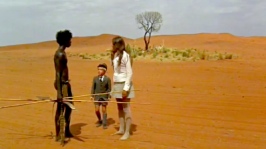WALKABOUT
(director: Nicolas Roeg; screenwriters: Edward Bond/based on the novel by James Vance Marshall; cinematographer: Nicolas Roeg; editors: Antony Gibbs/Alan Pattillo; music: John Barry; cast: Jenny Agutter (Girl), Lucien John (Boy), David Gumpilil (Aborigine), John Meillon (Man); Runtime: 100; MPAA Rating: GP; producer: Si Litvinoff; Criterion Collection; 1971-UK)
“A unique survival film, that has become a cult favorite.“
Reviewed by Dennis Schwartz
Walkabout is based on the novel by Australian author James Vance Marshall and was originally published as “The Children” in 1959. It has become a classic in Australia and England. It’s written by Edward Bond, whose screenplay plays out as a meditation onthe decay of civilization and the stupefying purity of the wilderness. Director and cinematographer Nicolas Roeg (“Performance”/”Don’t Look Now”/”Bad Timing”), in his first solo effort as director,provides some visually stunning nature shots, fills the tale with rich symbolism over the clashes between primitive and civilized cultures, clearly shows how the superior culture has little regard for the land through its wasteful hunting and its exploitative environmental strip-mining of the natural resources, and tags on how difficult it’s for these differing cultures (and races) to communicate with each other. John Barry’s otherworldly romantic musical score adds to the movie’s visceral pleasures. It’s a unique survival film, that has become a cult favorite.
In its simplest terms it’s the story of an attractive fourteen-year-old girl (Jenny Agutter, who was 17) and her playful 6-year-old little brother (Lucien John, the real-life son of Roeg) residing in a hi-rise luxury apartment building in Sydney, Australia, with their mother and depressed upper-class English geologist father (John Meillon), who takes the children for a picnic in the outback and tries to shoot them and when that fails blows up the car and shoots himself. The children dressed in their school uniforms are left abandoned in the harsh barren Australian outback and after a few days have a difficult time surviving on their own. They are saved by a 16-year-old aborigine on a walkabout (a tribal initiation into manhood, where he goes out alone in the wilderness to see if he can survive for six months), who helps the parched-lipped weary kids, fishes-out-of-water from their familiar comfortable materialistic world, lose their innocence about living naturally by getting them to tune into nature. The modern civilized children, even with their education, are lost souls in the mystical desert and are only saved through the survival skills of the aborigine who shows them how to get water (sucking water out of a dry creek bed with a fluted piece of wood)and hunt the desert animals, like the kangaroo and lizard, with his spear.
But Roeg is concerned with far more than his film being merely a Disney wilderness survival tale, and wishes to convey how sterile is the white city life compared to the beautiful unspoiled landscape of the outback, how the contact between the aborigine and the white girl arouses in him a primal sexual urge toward her–something she cannot quite understand in its full meaning to his way of life, which turns out fatal for him (I found this sequence implausible and awkwardly tacked onto the story, and it would have been better off not going in this direction unless it made itself a lot clearer). Roeg also wishes to make a strong statement about how the European culture exploits the more trusting primitive world and greedily tries to possess the natural resources that the natives have been the caretakers of since ancient times (having the aborigine come across homesteaders who kill without reason and energy companies that rape the land and then leave it abandoned and despoiled). Roeg questions the Europeans need for progress that takes them farther away from their roots with nature (though not saying progress is a bad thing, only that it’s questionable if it entails destroying another’s culture, destroying the environment, and not sharing the wealth with others).If you don’t like the message of the Noble Savage being superior to the educated European, because of his willingness to live in harmony with Mother Earth, at least it’s delivered through some beautiful visuals and the storytelling is first-class.

REVIEWED ON 6/1/2010 GRADE: A-